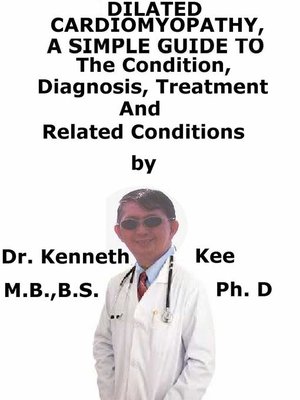Dilated Cardiomyopathy, a Simple Guide to the Condition, Diagnosis, Treatment and Related Conditions
ebook
By Kenneth Kee

Sign up to save your library
With an OverDrive account, you can save your favorite libraries for at-a-glance information about availability. Find out more about OverDrive accounts.
Find this title in Libby, the library reading app by OverDrive.



Search for a digital library with this title
Title found at these libraries:
| Loading... |
This book describes Dilated Cardiomyopathy, Diagnosis and Treatment and Related Diseases
Cardiomyopathy is the medical disease of the thickened or dilated heart muscle.
Dilated cardiomyopathy is a disorder in which the heart muscle becomes weakened and enlarged or has another structural disorder as the cardiomyopathy becomes worse.
As a result, the heart cannot pump adequate blood to the rest of the body.
There are many types of cardiomyopathy.
1.Dilated cardiomyopathy is the most frequent type.
2.Hypertrophic cardiomyopathy
3.Restrictive cardiomyopathy
4.Others -refer causes
Causes
The most frequent causes of dilated cardiomyopathy are:
1.Heart disease produced by a narrowing or blockage of the coronary arteries
2.Poorly regulated high blood pressure
There are many other causes of dilated cardiomyopathy, such as:
1.Alcohol or cocaine abuse
2.Diabetes, thyroid disease, or hepatitis
3.Medicines that can be toxic to the heart, such as drugs used to treat cancer
4.Abnormal heart rhythms that cause the heart to beat very fast for a long duration of time
5.Autoimmune illnesses
6.Disorders that run in families
7.Infections that involve the heart muscle
8.Heart valves that are either too narrow or too leaky
9.During the last month of pregnancy or within 5 months after the baby is born.
10.Exposure to heavy metals such as lead, arsenic, cobalt, or mercury
Symptoms
The symptoms of heart failure are most frequent.
Frequent symptoms are:
1.Chest pain or pressure (more probably with exercise)
2.Cough
3.Fatigue, weakness, faintness
4.Irregular or rapid pulse
5.Loss of appetite
6.Shortness of breath with activity or after lying down (or being asleep) for a while
7.Swelling of feet and ankles
Diagnosis
During the medical examination, the doctor may find:
1.The heart is enlarged.
2.Lung crackles (a sign of fluid buildup), heart murmur, or other abnormal sounds.
3.The liver is possibly enlarged.
4.Neck veins may be bulging.
Heart enlargement or other disorders with the structure can be seen:
1.Echocardiogram
2.Cardiac stress tests
3.Chest x-ray
4.Coronary angiogram to look at blood flow to the heart
5.CT scan of the heart
6.MRI of the heart
7.Nuclear heart scan (MUGA, RNV)
8.Heart biopsy (rarely needed)
Treatment:
Non Medical Care:
1.Rest
2.Oxygen
3.Low salt Diet
4.Treat hypertension
5.Treat angina with nitrates sublingually
6.Cardiac rehabilitation with mild exercise (muscular and pulmonary)
Some medicines can treat the symptoms:
1.Angiotensin-converting enzyme (ACE) inhibitors
2.Angiotensin II receptor blockers (ARBs)
3.Beta-blockers
4.Aldosterone antagonists
5.Cardiac glycosides
6.Diuretics
7.Vasodilators
8.Antiarrhythmics
9.Human B-type natriuretic peptide
10.Inotropic agents
11.Neprilysin inhibitor
12.Nitrates
13.Anticoagulants may be used in selected patients
Procedures and surgeries for the patient are:
1.A pacemaker to help treat slow heart rates or help the heartbeat stay in sync
2.A defibrillator that detects life-threatening heart rhythms and sends an electrical pulse to stop them (implantable cardioverter defibrillator)
3.Heart bypass (CABG) surgery or angioplasty to improve blood flow to the damaged or weakened heart muscle
4.Valve replacement or repair
For advanced cardiomyopathy:
1.A heart transplant may be advised if standard treatments have not worked and heart failure symptoms are very...






